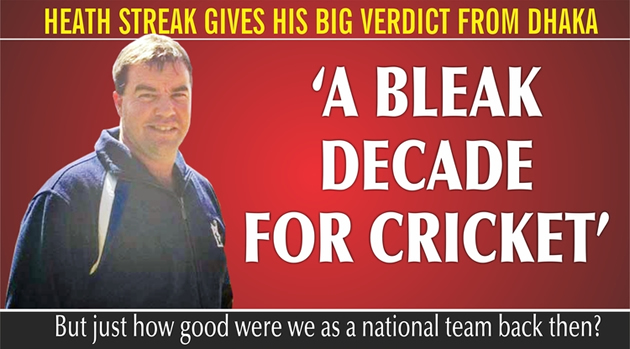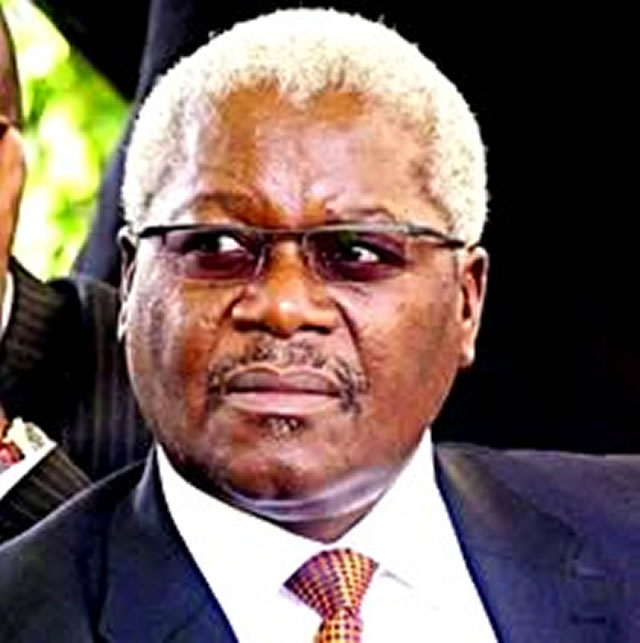A Bleak Decade For Cricket

 Robson Sharuko Senior Sports Editor
Robson Sharuko Senior Sports Editor
HEATH Streak has fired the first shots, in the countdown to Zimbabwe’s tour of Bangladesh next month, with the Tigers’ bowling coach describing the past decade as “a sad episode for Zimbabwe cricket” and laying the blame squarely on the game’s administrators.
Streak, a former national team captain, now works for the Bangladesh Cricket Board as the bowling consultant for the Tigers and told ESPNCricinfo, in a wide-ranging interview, that he believes the best Zimbabwe team was the one that represented the nation between 1999-2003.
Zimbabwe cricketers will undertake their longest tour, in more than a decade, when they visit Bangladesh next month for their first showdown against their former skipper and bowling coach in three Tests and five ODIs.
Streak reflected on the 1999 Zimbabwe team, which reached the Super Six stage of the World Cup in England, saying it represented a golden period for local cricket.
“We upset India and that was a massive one for us. We had an opportunity also to beat Sri Lanka but we didn’t quite play our best game of the tournament,” Streak told Cricinfo.
“The big win against South Africa was a massive boost for us. We were really riding the crest of the wave at that stage. Then we lost to Pakistan and we didn’t do as well in the Super Six as we would have liked.
“That was a bit of a disappointment after having a side as good as we had. We felt that even when we played Australia and gave them a good run for their money at Lord’s — if we played to our best and the top sides weren’t quite at their best we were capable of beating any team in that World Cup.”
The former Zimbabwe skipper said the past decade has been a bleak one for domestic cricket.
“I think the whole period from 2003 up until now has been a sad episode for Zimbabwe cricket, given the number of players of good quality who departed after that World Cup,” said Streak.
“Andy Flower and Henry Olonga were leaving us for the UK. Murray Goodwin and Neil Johnson went back to Australia and South Africa respectively. They continued to have good careers.
“We lost Sean Ervine, a world-class performer. Travis Friend and Andy Blignaut stopped playing. Tatenda Taibu retired early. We had Gary Ballance, now playing for England, who left Zimbabwe in that period because he didn’t see a future playing for Zimbabwe.
“We had another person who left in that period, Kyle Jarvis, who retired recently. And another youngster left during that period is also representing New Zealand now, Colin de Grandhomme.
“If things were managed properly, between 2003 and now, we wouldn’t just be hoping for a regular upset every now and then. We could be a World Cup side. That would be a No. 5, 6, 7 ranking.
“You put those players (who left) alongside the world-class players that we have with the likes of Brendan Taylors and Hamilton Masakadzas and Prosper Utseyas and some of these young guys, we would have a real pool and a world-class team. That is the sad thing.”
While it’s true that the Zimbabwe national team was very competitive, during the 1999-2003 period, and could stand, at times, toe-to-toe with the best in the world, there has been a frustrating tendency to overplay the team’s performance.
A favourite weapon for anyone who has an axe to grind with Zimbabwe Cricket has been to point to the so-called alarming decline of the national team and take a stroll down memory lane, to the period around the turn of the millennium, to bath in the nostalgic freshness of an imagined past that represented greatness.
Admittedly, Zimbabwe had some world-class players back then, with Andy Flower at one stage being ranked the leading Test batsman in the world, and Streak was constantly ranked among the top bowlers on the globe.
But did the team produce the kind of results that represent greatness or their success has been a myth that should just be embraced, and celebrated, without being tested? Well, what do the results tell us because in sport it’s all about the end product, the result?
During the so-called golden period, when the team twice managed to qualify beyond the group stages of the World Cup, records show that Zimbabwe lost 26 Test matches, drew 13 and won just six Test matches , including four against Bangladesh, with the three victories over the Tigers coming here on home soil.
Of course, there were two big wins against India in a one-off Test here and against Pakistan (1-0), in two Tests in their backyard, but 26 defeats show that, more often than not, the team usually lost their matches although the 13 draws could represent a sign of their combative spirit.
In terms of Test series, they lost 19 of their duels during that period, won just six — the one-off Test against India, the 1-0 win in Pakistan and the four against Bangladesh.
Maybe, given that we were relatively new on the Test scene, focus should, as Streak appears to have done on his assessment, concentrate on our results in the limited overs.
Of course, there were good performance in the World Cup in 1999 but what is rarely talked about is that we didn’t win any game in the Super Six in England, we were on the ropes against New Zealand after managing just 175 in our innings while the Kiwis were 70-3, in 15 overs in reply, when rain intervened, we were well beaten by Australia who scored 303-4 and Pakistan beat us by 148 runs.
While we progressed beyond the group stages at the 2003 World Cup, thanks to the donated points from England’s no-show and the rain intervention in the match against Pakistan, we lost all our Super Six matches — a six-wicket loss to New Zealand, a seven-wicket loss to Kenya and a 74-run loss to Sri Lanka.
In tour ODI matches, which were neither a triangular nor an ICC championship, during that period, the golden generation lost 63 of their 89 matches, won just 24, one had no result and the other match was tied.
Losing 70 percent of your matches certainly doesn’t represent greatness.
In terms of the ODI series, there were 18 losses for the Zimbabweans, during that period, including 5-0 whitewash against England, Sri Lanka and Pakistan, there were just five ODI series victories – twice against New Zealand, twice against Bangladesh and one against Kenya.
In the triangulars and the ICC championships, during that period, there were 70 losses for the Zimbabweans and 25 victories, of course the statistics of the wins boosted by our annihilation of Kenya and Bangladesh in the Presidents Cup in Kenya before the turn of the millennium and a good run when we reached the final of the NatWest Challenge in England in 2000.
But when you look closely to our sets of results, after we beat England, in the first match of the NatWest Series that featured South Africa in 2003, you will see this depressing run — lost to South Africa, lost to South Africa, lost to England, lost to South Africa, lost to Australia, lost to India, lost to Australia, lost to India, lost to India, lost to India, lost to England, lost to Sri Lanka, lost to Pakistan, lost to Sri Lanka.
Maybe, when one looks at these results, it’s probably unfair to label the current team as hopelessly out of depth, and using the past teams as a benchmark, because when you look at the return, in terms of winning and losing, there isn’t much of a difference.
Oh, by the way, the current boys ended a 31-year wait to beat Australia.









Comments